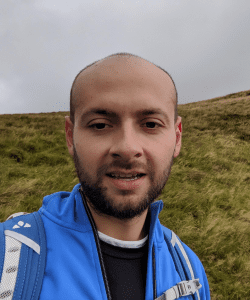Lukas Tamayo-Orrego – Montreal Clinical Research Institute (IRCM)/McGill University

Scientific Publication
Lukas Tamayo-Orrego, David Gallo, Frédéric Racicot, Amandine Bemmo, Sushmetha Mohan, Brandon Ho, Samer Salameh, Trang Hoang, Andrew P. Jackson, Grant W. Brown & Frédéric Charron
Sonic hedgehog accelerates DNA replication to cause replication stress promoting cancer initiation in medulloblastoma. Nature Cancer 1, 840–854 (2020). https://doi.org/10.1038/s43018-020-0094-7
Funding sources
This work was supported by the Canadian Institutes of Health Research, the Fonds de Recherche du Québec–Santé, the Canada Foundation for Innovation, the Canada Research Chair program, the Canadian Cancer Society Research Institute, the Medical Research Council and the European Union’s Horizon 2020 Research and Innovation Programme ERC Advanced Grant. Lukas Tamayo-Orrego was supported by the Caldas (Colciencias) and Djavad Mowafaghian Foundation fellowships.
A protein called Sonic hedgehog is a key player in brain cancer initiation.
Medulloblastoma is the most common form of malignant brain cancer in children. While not always inherited, conditions such as Gorlin syndrome increase the risk of medulloblastoma. The mechanisms generating cancer-initiating mutations are not well understood. New research by Lukas Tamayo-Orrego and colleagues shed some light on this process by identifying a protein called Sonic hedgehog as a key player in medulloblastoma initiation.
During normal brain development, neural progenitor cells called granule cell precursors (GCPs) proliferate in response to Sonic hedgehog (Shh) to produce the largest neuronal population in the brain. In this study, Lukas Tamayo-Orrego and colleagues investigated whether the normal proliferative effects of Shh caused genomic instability and DNA lesions responsible for medulloblastoma formation. Their results demonstrate that by profoundly accelerating DNA replication in GCPs, Shh caused an unexpected and a novel form of DNA replication stress leading to genomic instability. Because these genomic changes rarely cause medulloblastoma, the brain tolerates significant levels of replication stress. Their results suggest this stress is a trade-off or by-product of the fast proliferative effects of Shh necessary to produce the largest neuronal population, granule cells, in the brain.
Children with Gorlin syndrome (a cancer predisposition disorder) have only one active copy of a tumour suppressor called PTCH1 instead of two. In this sensitized genetic background, Shh-induced recombination provides a clear mechanism for the loss of the active PTCH1 protein and medulloblastoma formation. This is indeed a main conclusion of this publication showing that, in a cancer mouse model of Gorlin syndrome, inhibition of Shh-dependent replication stress prevents medulloblastoma initiation.
Therefore, from a pragmatic perspective, this work provides a proof of principle that attenuating DNA replication stress in cells at risk of becoming malignant can prevent cancer initiation. Since this result was achieved using inhibitors currently in clinical trials (albeit for different purposes), this finding could have implications for treatment. The researchers conclude that efforts aiming at reducing endogenous replication stress could be effective to prevent – rather than to treat – certain cancers.
Lukas Tamayo-Orrego, MD
As a PhD Student in Dr. Frédéric Charron’s laboratory at the Montreal Clinical Research Institute (IRCM)/McGill University, Dr. Lukas Tamayo-Orrego, MD demonstrated autonomy, scientific creativity and innovation at the highest possible level. Remarkably, he conceived and conceptualized most of this large-scale study, which represents an impressive number of experiments, and an outstandingly large range of technical approaches. He brought new research themes and techniques to his laboratory, and even pioneered novel techniques and approaches never performed before in any other labs. Finally, he wrote most of the manuscript.
Lukas Tamayo-Orrego is currently a postdoc in the lab of Andrew P. Jackson at the MRC-Human Genetics Unit, University of Edinburgh, and is now supported by an EMBO Long-Term Fellowship.
